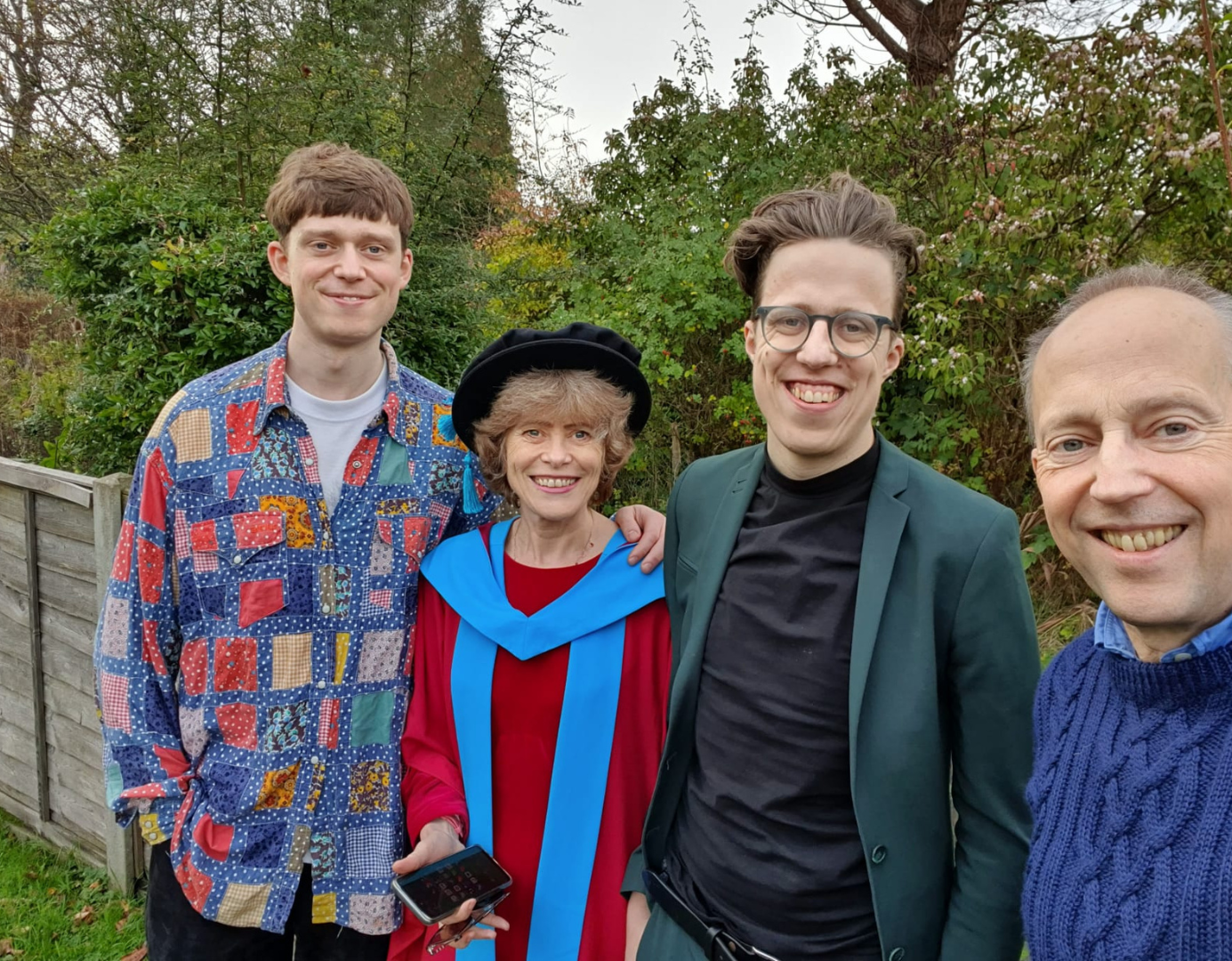Sarah
A diagnosis of non-Hodgkin lymphoma led Sarah in a new direction, resulting in a PhD.

After leaving school in 1981 I trained and worked as a nurse at The London Hospital. I worked for many years mainly as a District Nursing Sister in the East End, Brighton, and Sevenoaks. In 2003 I had a recurrence of ME/Post Viral Fatigue Syndrome and, as a result, was granted ill health retirement in 2004.
Shortly afterwards I had gallstones removed, but went on to develop a sub acute abdominal obstruction over a three week period, and lost over three stone- 30% of my body weight. My husband and I thought I was dying yet doctors were reluctant to admit me. At the time our sons were nine and eleven years old.
After three hospital admissions, and exploratory emergency surgery I was found to have a 6 cm by 4cm tumour near my appendix which had been missed on two ultrasound scans. I had extensive surgery and half my colon was removed because of damage caused by an intussusception, and strangulated bowel. Initially it was thought to be a carcinoid tumour, but histology showed it to be diffuse large B-cell lymphoma, a type of non-Hodgkin Lymphoma.
I was devastated. I had cared for many patients with cancer, and blood cancers over my 23 year nursing career and did not want a bone marrow biopsy, or chemotherapy. As I was still an inpatient for three weeks after my surgery, I had a bone marrow biopsy with midazolam as sedation, and I don't recall a thing. Lying in the hospital after the procedure, attached to several drips and drains, gave me a chance to reflect. Like many people in the same situation, I just wanted more precious time with my husband and to see our lads grow up.
I was discharged home to recuperate and gain weight before chemotherapy started two months later. I was lucky and only had four rounds of R-CHOP chemotherapy as it was purely to mop any of the tumour left over after the emergency surgery.
Personally, my hair loss was the most devastating side effect as my lovely titian hair fell out, and I realised how so much of our identity is entwined in our appearance. A salutary lesson after nursing for 23 years.
Despite occasional scares - ME has some similar symptoms to non-Hodgkin lymphoma - I have been very lucky, although I have developed osteoporosis due to an early menopause which was probably induced by the chemotherapy.
As our sons were growing up I became an amateur genealogist and developed a keen interest in the history of nursing. It was whilst researching the military and civilian nursing career of Mary Pinsent, the recipient of a London Hospital nurses badge, I decided that I wanted to become more proficient at writing up my research.
When my boys were both at university I wanted to stretch my brain again and I took tentative steps into studying. In 2013 I started an MLitt in Family and Local History via distance learning with the University of Dundee. I loved studying again and as my postgraduate course came to an end, I wanted to continue my research further. During the research for my master's dissertation into the nurses who worked in the 1897 Maidstone Typhoid Epidemic, I was intrigued that a disproportionate number had trained, or were still working at 'The London' under the matron, Eva Lückes. Although I had lived in the Luckes nurses home for a year during my training, I knew very little about her. So, my fascination with Eva grew, and in particular that Florence Nightingale, her friend and mentor, had referred to her as a 'Matron of Matrons'.
In April 2018 I started my doctoral research into Eva at the University of Huddersfield. This was a huge personal challenge for me, and there were many times that I felt daunted, but I so enjoyed it.
I am so pleased that I took the leap and continued studying, and it was great to celebrate at my graduation last autumn, and with our sons back at home afterwards. And yes, I did show that Eva was indeed a matron maker. During her 39 year tenure as Matron of The London Hospital Eva trained over 474 nursing leaders. I am now enjoying delving into other areas of Eva's life as I slowly write her biography, and have just nominated her for an English Heritage Blue Plaque.
Despite other health issues I am so grateful to have been in remission for nearly 19 years, and am only too aware that other people are not always as fortunate.'
